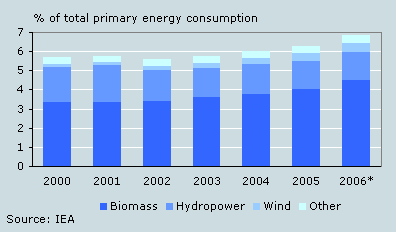Renewable energy consumption relatively low in the Netherlands

In 2006, renewable energy made up 2.7 percent of total energy consumption in the Netherlands, distinctly lower than the average of 6.8 percent across the EU-15. The amount of energy generated from biomass and hydropower in particular was relatively low in the Netherlands.
Consumption of primary renewable energy in the EU-15, 2006*

Large share of renewable energy in Scandinavia and Austria
Proportionally, the consumption of renewable energy was highest in Sweden, Finland and Austria. In these countries, the share of renewable energy was 20 percent or more in 2006. Biomass and hydropower are important sources of energy in these countries.
In the Benelux and the United Kingdom, on the other hand, renewable energy contributed less than 3 percent. Due to the high population density, the wooded area per inhabitant is small and there are few mountains with fast-flowing rivers for hydropower generation.
Households largest consumers of renewable energy from biomass
Two thirds of renewable energy in Europe is generated from biomass. Nearly half of biomass energy is wood energy used by households. In rural areas, wood is often a suitable alternative for fossil fuels, because it is amply available and most people are not connected to a natural gas or heat grid.
Hydropower is also a major source of renewable energy, but the generation of renewable energy from hydropower stagnates, mainly because most places where hydropower can be generated are already exploited. The share of wind energy is growing rapidly, but is as yet less than one third of the amount of energy generated by running water.
Consumption of primary renewable energy in the EU-15

Renewable energy slowly gaining ground in Europe
The consumption of renewable energy in Europe has gradually grown in recent years: from 5.7 percent in 2000 to 6.8 percent in 2006, but the share of renewable energy is still far below the target set by the EU (12 percent in 2010) in 1997 and is not hard and fast. There are no legal means to force EU member states to contribute according to plan.
On the European summit of March 2007, heads of government agreed to increase the share of renewable energy to 20 percent in 2020. In view of the fact that progress was sluggish in 2010, when agreements were nonbinding, the EU currently seeks to create binding arrangements.
Reinoud Segers